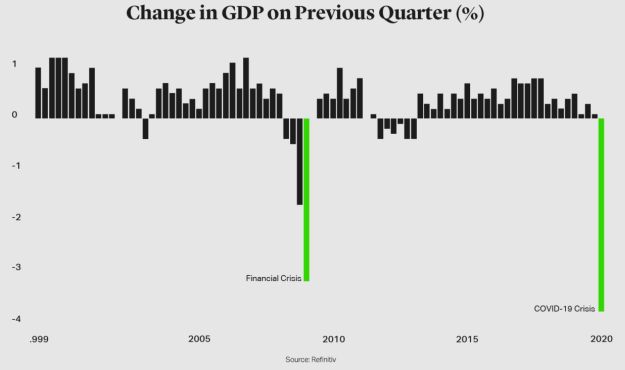Private equity firms are still sitting on sizeable reserves of dry powder. They are also continuing to raise new funds for new deals – from distressed debt to plain vanilla buyouts (see article, Fundraising for Opportunities Ahead.) Investment activity, however, is freezing up as buyers and sellers wrestle with significant volatility and an uncertain outlook.
Fundraising for Opportunities Ahead
Diverging Price Expectations
The unprecedented challenges brought about by the coronavirus (COVID-19) pandemic have made assessing future performance difficult for GPs. The latest data only hints at the severity of the economic impact in Europe. GDP in the UK contracted by 2% over the first quarter, including a 5.8% hit in March alone1. Meanwhile, in France, the economy declined by 5.8% in the first quarter2, while across the Eurozone as a whole, GDP fell by 3.8%3.
Many corporates are suffering sharp falls in revenues and profits, with those in leisure, retail and travel bearing the brunt. Against a backdrop of struggling economies and businesses, buyers and sellers are often far apart in their price expectations. Most private equity buyers are looking to buy assets at a lower valuation reflecting the current economic environment, while sellers believe that recovery – when it comes – will lead to a bounce-back in valuations. This polarisation in views extends from venture capital investments in start-ups to buyout firms' megadeals.

Hung Q1 Deals
As of May, a significant proportion of Q1 deals had yet to close. Some sponsors – most notably in the US – have tried to walk away from deals due to the coronavirus impact and are already facing lawsuits as a result. But others have managed to settle amicably. New York-listed L Brands agreed to cancel the $525 million sale of a majority stake in Victoria's Secret to Sycamore Partners to avoid litigation, and will instead pursue its own turnaround strategy for the lingerie retailer.
Especially in Europe, there are likely to be relatively few examples of sponsors walking away from agreed deals, given the prevalence of transaction documents protecting deal certainty. Nevertheless, there is a growing sentiment that sponsors might carefully consider all options available rather than continuing to pursue an investment that might need to be written down sharply after closing. In late April, Blackstone warned that it may not be able to go ahead with its acquisition of Amsterdam-listed NIBC after the Dutch bank postponed the payment of its final dividend, a step not foreseen in the merger documents, but which would impact on the private equity firm's funding plans4. The bank later proposed to pay the final dividend to Blackstone before the final deal closing to remove the financing hurdle5.
Identifying Winning Sectors
Not all sectors, nor all businesses, are suffering to the same extent. In the company's first quarter results, Microsoft bucked the trend with improved revenue growth, which CEO Satya Nadella attributed to an acceleration in cloud computing adoption by businesses6. The COVID-19 crisis is redrawing the lines in many fields of technology and healthcare – e-commerce, online education and online diagnostics. Private equity firms are keen to identify and push ahead with investments in sectors and spheres that are seen emerging from the disruption as winners in the longer term.
Among recent deals, Clayton, Dubilier & Rice completed its £577 million acquisition of the UK healthcare communications group Huntsworth at the start of May7, while Levine Leichtman bought Belgian e-learning group SiPM. Despite the examples, the right opportunities can be challenging to identify and price in the current volatile environment. Furthermore, the best deals could also be fiercely fought, given the appetite from private equity firms and corporates to invest in secular growth stories.
Market Intelligence Gathering
In the immediate aftermath of lockdowns across Europe, private equity firms took rapid action to stabilise portfolio companies (see April article, Crisis support measures for portfolio companies). Having ensured that their businesses had adequate liquidity for the short term, and adapted operations and finances where needed, investment professionals are refocusing on new deals.
Crisis Support Measures for Portfolio Companies
The first phase of the process is intelligence gathering. Many GPs are reassessing existing targets and identifying new potential investments as the crisis reshapes forecasts. They are also watching their peers closely to see what position they are in and what they are doing.
The longer the crisis continues, the more opportunities are likely to emerge – such as corporate carve-outs from publicly listed companies, or public-to-private deals. Although many existing portfolio companies could need more support before the crisis is over, according to a survey from consultancy firm New Street Group, 89% of private equity firms expect to be deploying capital within the next three to six months8.
Footnotes
1. UK economy shrinks at record 5.8% pace in March. Nearly all parts of economy hit by lockdown measures to fight coronavirus. Source: Financial Times - Article
2. Eurozone economy shrinks by fastest rate on record. GDP fall illustrates damage inflicted by coronavirus lockdowns as ECB prepares to meet. Source: Financial Times - Article
3. Preliminary flash estimate for the first quarter of 2020 GDP down by 3.8% in the euro area and by 3.5% in the EU -3.3 % and -2.7% respectively compared with the first quarter of 2019. Source: Eurostat - News Release Indicators
4. Update on public offer for all NIBC shares. Source: Blackstone - Press Release
5. NIBC says it will pay 2019 dividend to Blackstone to ensure acquisition. Source: Reuters
6. Microsoft growth accelerates as pandemic boosts cloud business. Source: Financial Times - Article
7. Clayton, Dubilier & Rice acquires healthcare services company in GBP577m deal. Source: Private Equity Wire
8. Private equity firms expect to restart deploying capital in three to six months, says survey. Source: Private Equity News
To view original article, please click here.
The content of this article is intended to provide a general guide to the subject matter. Specialist advice should be sought about your specific circumstances.


